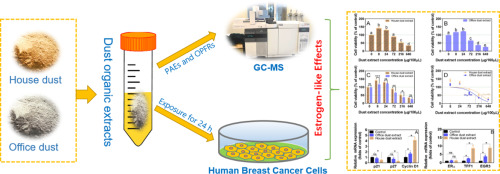Science of the Total Environment ( IF 9.8 ) Pub Date : 2020-04-08 , DOI: 10.1016/j.scitotenv.2020.138505 Ping Xiang 1 , Kun Wang 2 , Jue Bi 2 , Mengying Li 2 , Rui-Wen He 3 , Daolei Cui 2 , Lena Q Ma 4

|
Indoor dust often contains organic contaminants, which adversely impacts human health. In this study, the organic contaminants in the indoor dust from commercial offices and residential houses in Nanjing, China were extracted and their effects on human breast cancer cells (MCF-7) were investigated. Both dust extracts promoted proliferation of MCF-7 cells at ≤24 μg/100 μL, with cell viability being decreased with increasing dust concentrations. Based on LC50, house dust was less toxic than office dust. At 8 μg/100 μL, both extracts caused more MCF-7 cells into active cycling (G2/M + S) and increased intracellular Ca2+ influx, with house dust inducing stronger effects than office dust. Further, the expression of estrogen-responsive genes for TFF1 and EGR3 was enhanced by 3-9 and 4-9 folds, while the expression of cell cycle regulatory genes for cyclin D was enhanced by 2-5 folds. The results suggested that organic dust extract influenced cell viability, altered cell cycle, increased intracellular Ca2+ levels, and activated cell cycle regulatory and estrogen-responsive gene expressions, with house dust showing lower cytotoxicity but higher estrogenic potential on MCF-7 cells. The results indicate the importance of reducing organic contaminants in indoor dust to mitigate their adverse impacts on human health.



























 京公网安备 11010802027423号
京公网安备 11010802027423号